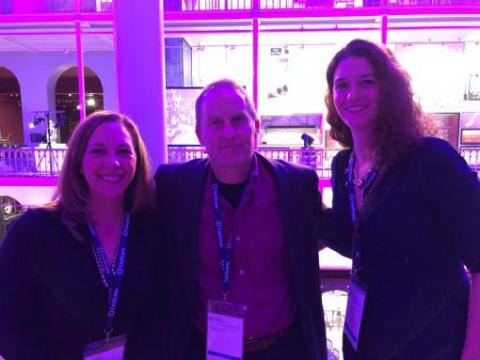Christopher Schmid, Professor of Biostatistics and Chair of Biostatistics, along with CESH’s Valerie Rofeberg, Biostatistician and Senior Research Associate, and Stacey Springs, Investigator in Health Services, Policy and Practice, attended and presented at the 25th Cochrane Colloquium in Edinburgh, UK which took place from September 16-18, 2018.
Center of Evidence Synthesis in Health Oral Sessions:
Oral session: Measuring the impact of participating in community-engaged evidence synthesis research
All authors in correct order: Springs S1, Rofeberg V1, Brown S2, Boudreau S3, Baruch J4
Presenting author: Stacey Springs
Background:
Community-engaged research (CEnR) involves a bidirectional partnership between researchers and community members to design and execute research studies. Including community members on research teams enhances the quality and applicability of research and promotes health equity though inclusivity. The objective of this community-engaged evidence synthesis project was to develop policy recommendations that integrate arts-based interventions within a statewide population health plan. Over the course of the 18-month project, we collaborated with > 25 community team members and provided didactic training and mentorship in evidence synthesis methods.
Read more about the session here.
Oral session: Barriers to implementation of evidence synthesis methods education for broad audiences
All authors in correct order: Springs S1, Sullivan A1, Rofeberg V1, Hall M1, Saldahna I1, Balk E1, Lau J1, Schmid C1
Presenting author: Stacey Springs
Background:
Users outside of academia are increasingly adopting evidence synthesis methods to inform healthcare decisions. Obtaining and updating these skills while in the workforce presents substantial challenges. In response to the growing need for professionals to learn evidence synthesis methods, our academic center has been developing flexible, free, open-access, online educational resources to accommodate professionals in the workforce, balancing rigorous methodological standards with accessibility. The audience of our program includes payers, patients/advocacy groups, policy-makers, funders and journalists. Though evidence synthesis projects typically engage these communities as stakeholders or research partners, there are significant challenges to developing training materials for non-traditional audiences.
Read more about the session here.
Oral session: Training community research partners in evidence synthesis methods: a pilot study
All authors in correct order: Rofeberg V1, Springs S1, Brown S2, Boudreau S3, Baruch J4, Sullivan AJ1
Presenting author: Valerie Rofeberg
Background:
Conducting evidence synthesis research requires specific expertise, but assessing the veracity and validity of 'evidence-based' claims is crucial for all. As part of a community-engaged research project, we adapted an existing evidence synthesis training curriculum for a non-expert audience. The Rhode Island Arts & Health Advisory group project is a > 25 member working group charged with developing integrated arts-based health care interventions into population health planning. Our Center served as an academic partner to facilitate the development of evidence-based recommendations and provided training and mentorship on evidence synthesis methods. Evidence synthesis training was delivered monthly with interactive sessions, which included didactic and hands-on components. Using web tutorials, mentoring and video conferencing, we worked collaboratively on all aspects of the evidence synthesis to ensure participants were supported in the process.
Read more about the session here.
Oral session: Free and open-access online systematic review curriculum for broad audiences
All authors in correct order: Sullivan AJ1, Springs S1, Rofeberg V1, Kaminsky J1, Saldhana I1, Hall M1, Balk E1, Lau J1, Schmid C1
Presenting author: Christopher Schmid
Background:
Systematic reviews are relevant to a range of audiences that typically do not have prior evidence synthesis training. These include patients, payers, advocacy groups, policy makers, librarians, journalists, and legislative staff. However, there is a dearth of free, open-access materials to help these audiences fully understand and use evidence syntheses.
Read more about the session here.

